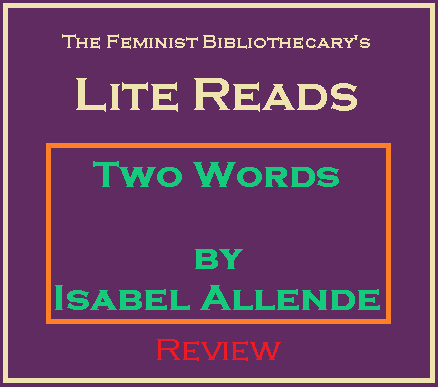Two Words Isabel Allende What Are the Two Words

Week fifty-three of Lite Reads comes to a close as we finish our two-week selection Two Words by Isabel Allende. There were questions as food for thought on social media as people had the chance to read it and think about it. Before I announce the next Lite Reads selection (September 1), I will be sharing my own thoughts here. Spoilers ahead for those who haven't finished reading the story yet.
Two Words by Isabel Allende, translated to English from Spanish by Margaret Sayers Peden, is a magical realism story with political undertones. Belisa Crepusculario grew up impoverished, and she made a name for herself by selling words, charging various rates depending on the kinds of words needed. The Colonel, a rebel in the Mexican Civil War, decides to run for president, and he sends one of his men to kidnap Belisa so that she can write a presidential speech to help him win the election legitimately. Belisa writes him the speech, but she gifts him two additional words. The speech wins over everyone who hears it, but the words torment The Colonel until his man kidnaps Belisa again for her to undo what she has said to him, but The Colonel calms when they simply hold hands. It is widely believed that the two words (never explicitly stated in the story) are "Te amo," Spanish for "I love you."
Belisa Crepusculario grew up in poverty, but she learned to read and write, and gained the skills to be a renowned seller of words. I think one of the most striking things about Two Words is the way we get to look at the impact of words. Belisa sees that words have innate value, and as she travels across the country through towns and cities and villages, she allows others to see that same innate value words hold. Whether it is for compliments, arguments, or anything else, we see that words hold power. Belisa imbues words with a sense of magic, the kind of magic that anyone who has been moved by a book or a speech in a film has felt, and that sense of magic expands beyond herself. Words aren't just words, they have meaning and power. Words change the face of lives and countries, and, as Belisa experiences firsthand, words can have people thinking you're a witch if they don't like the way you've used them to influence others. Ultimately, the major moments in this story revolve around the way Belisa uses words or chooses to give them to others.
Although selling words isn't a real profession in this world (if only!), I think the work Belisa does is incredibly reflective of real professions. Two Words gives us a taste of the way we see words sold in real life. Belisa serves as a speechwriter, a novelist, a journalist, a teacher, and more. Although there is a sense of magic around the selling of words, Belisa never really does anything actually magical. She impacts the lives of individuals and the politics of larger communities, but it is solely through the words she shares. El Mulato, the right-hand man to The Colonel, even believes that the two words she gave to The Colonel have cursed him, but no magic has taken place, only words. I think that storytellers in many forms of media have the gift of making us forget their words are not supernatural, and that's what Belisa puts me in mind of.
The story often focuses on The Colonel's desire to become president, something he needs Belisa's help to do. I think the way this is framed is really fascinating. Although The Colonel wants the best for the country and wants to be honest to the people about what he wants for them, we see that it is the words themselves that influence the people the most. It's reflective of the way the best orators are often so beloved in politics and remembered from history, regardless of the actual policies they implemented and the ideas they espoused. Even with that in mind, what influences The Colonel himself the most are the two words Belisa shares with him alone. We see the ways that grand speeches can influence the public, but that sometimes what influences us the most as individuals is tenderness and a personal touch.
Overall, Two Words by Isabel Allende is a fascinating little story with a lot to unpack. There are a lot of big ideas in a small space, and it's an ideal story to read as part of a study. Without reading further into it, it was still a fascinating story to read and I enjoyed experiencing it. It's actually the first time I have read Isabel Allende, although a number of her books are on my TBR, and it definitely makes me want to get to her novels sooner.
I hope everyone who participated by reading the story and following along on social media enjoyed the story. If you have more thoughts to add, please feel free to comment on this post, or anywhere on The Feminist Bibliothecary's social media. Week fifty-four begins tomorrow, September 1, with a brand new short story selection.
Two Words Isabel Allende What Are the Two Words
Source: https://thefeministbibliothecary.wordpress.com/2019/08/31/lite-reads-review-two-words-by-isabel-allende/#:~:text=It%20is%20widely%20believed%20that,a%20renowned%20seller%20of%20words.